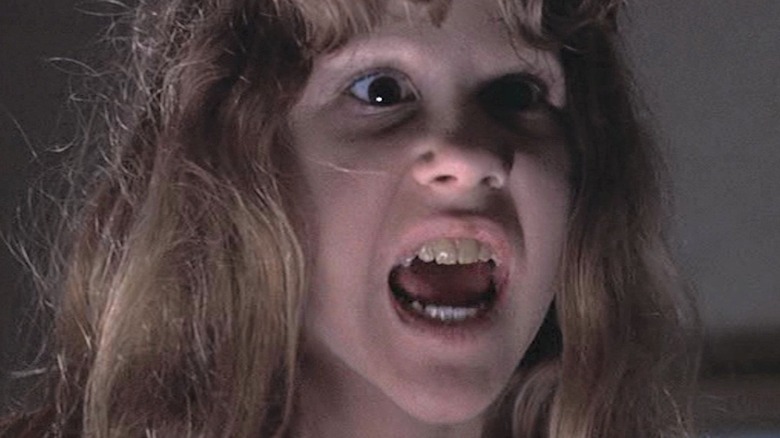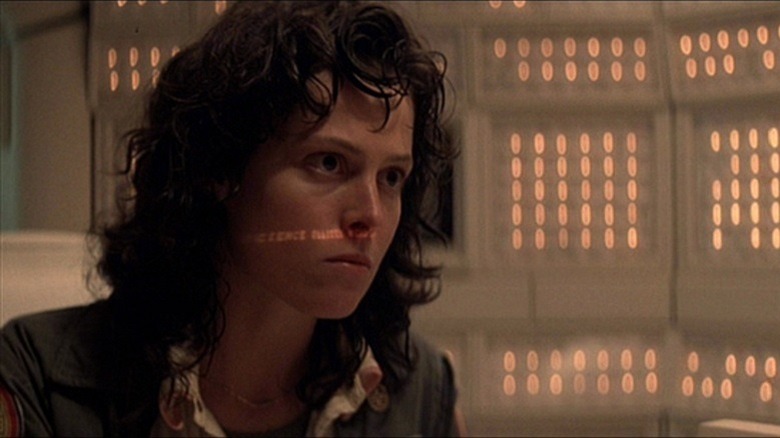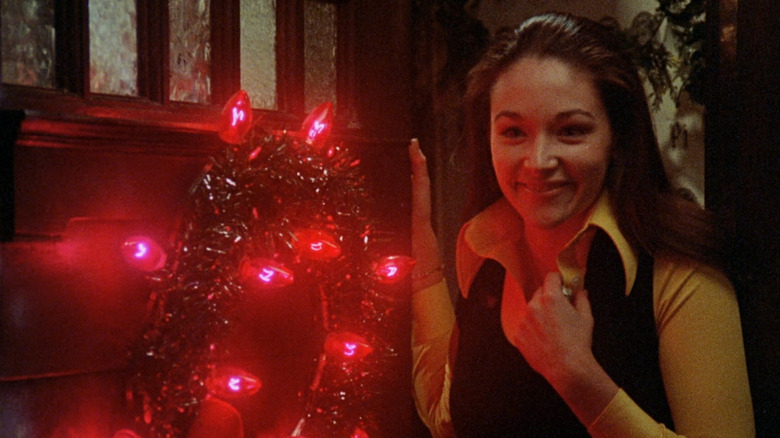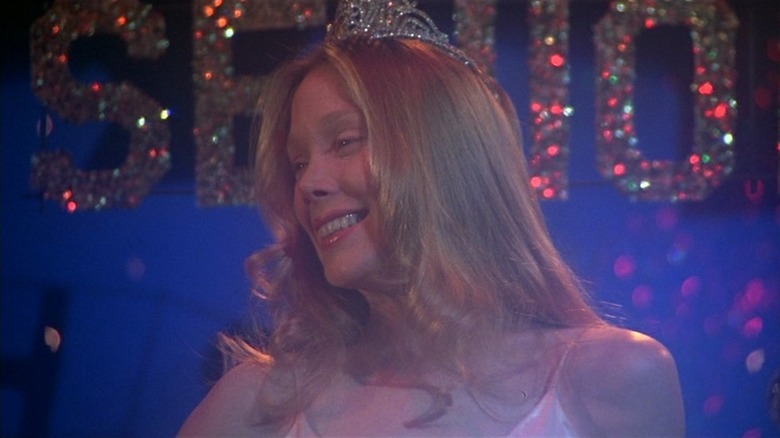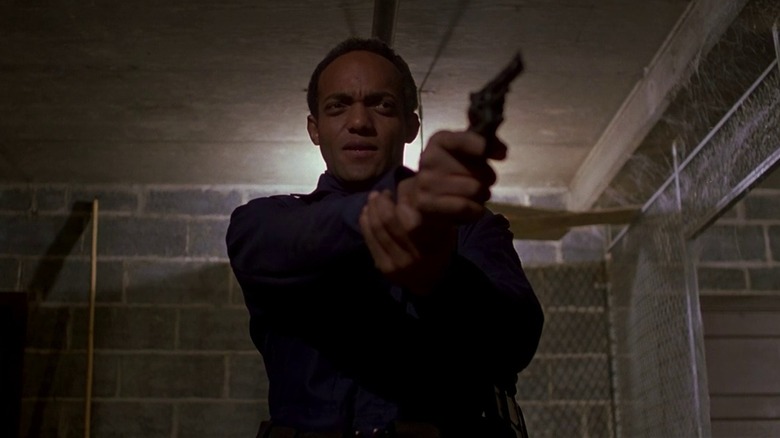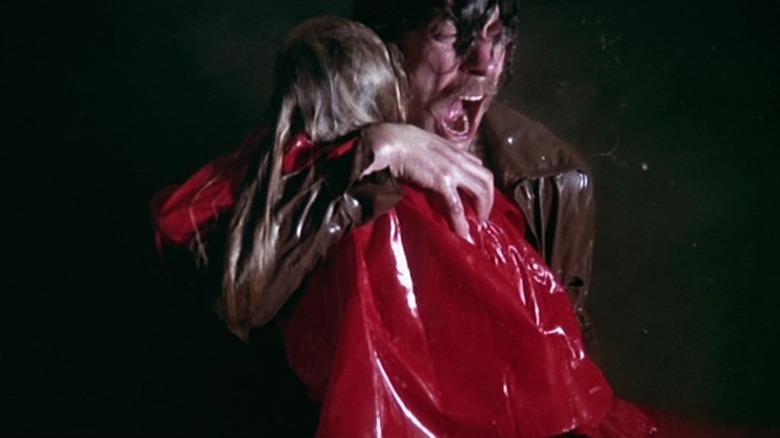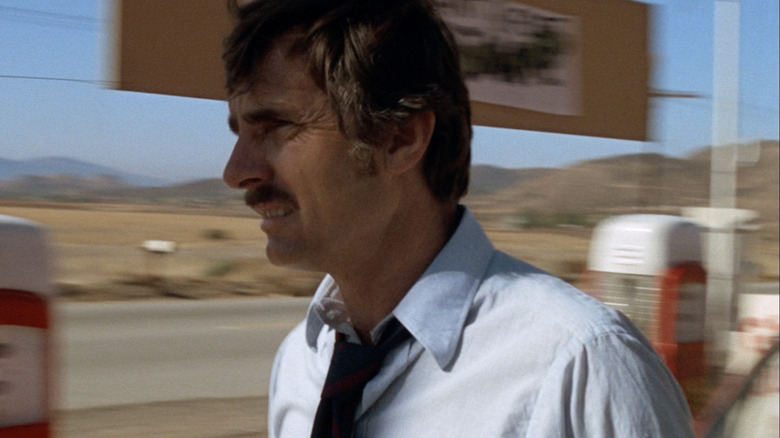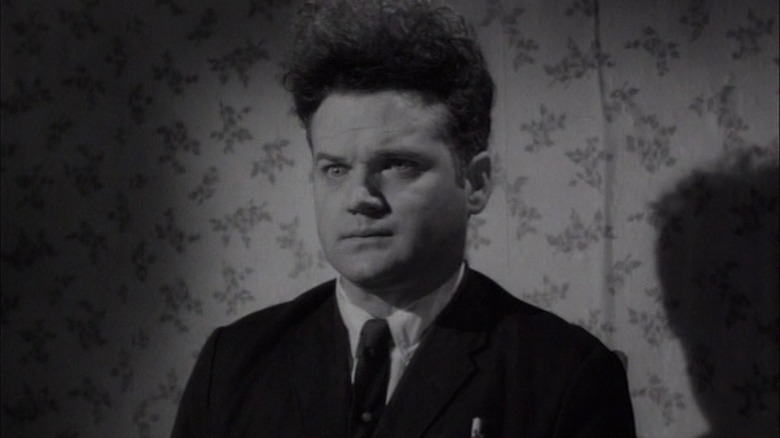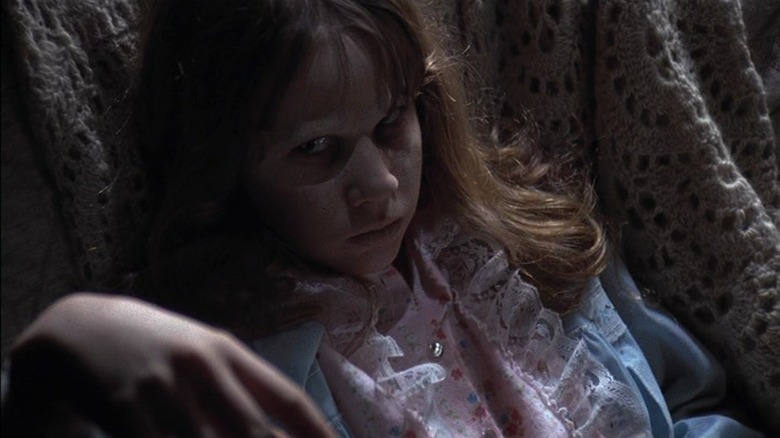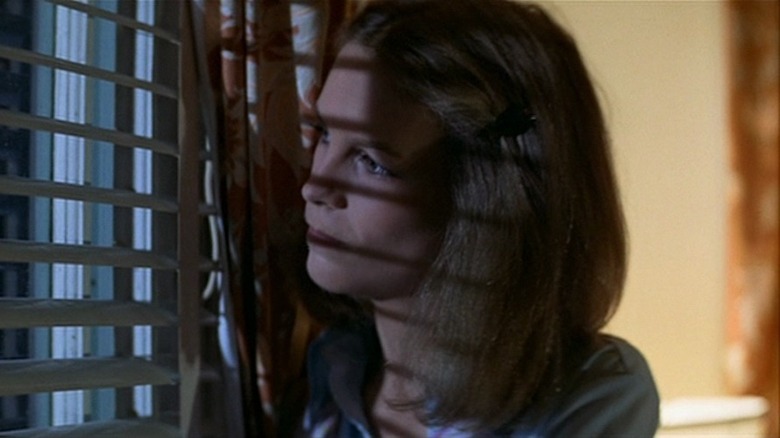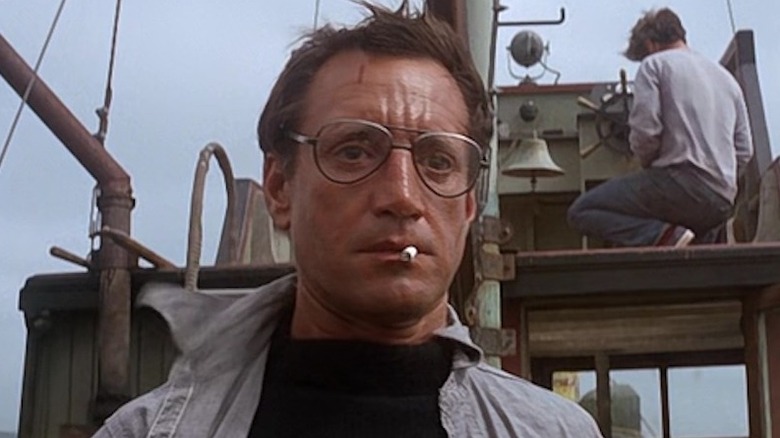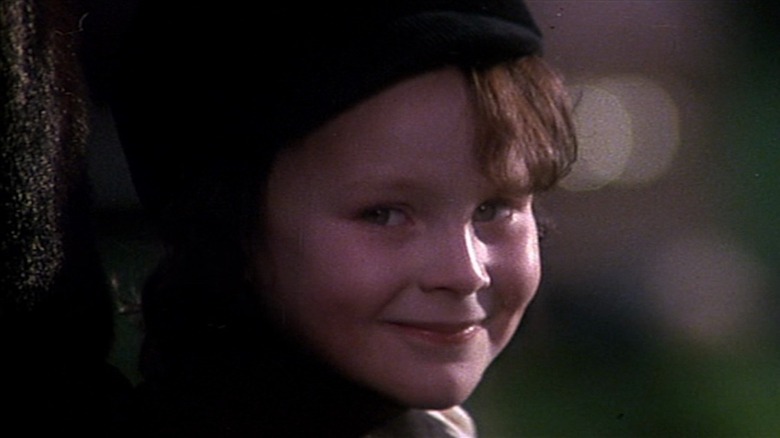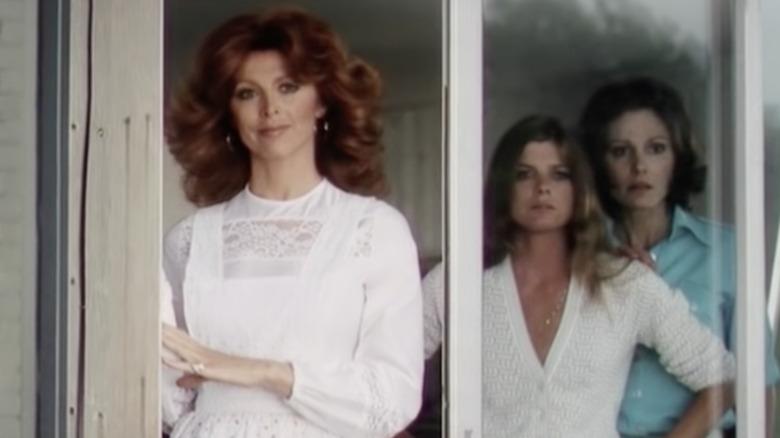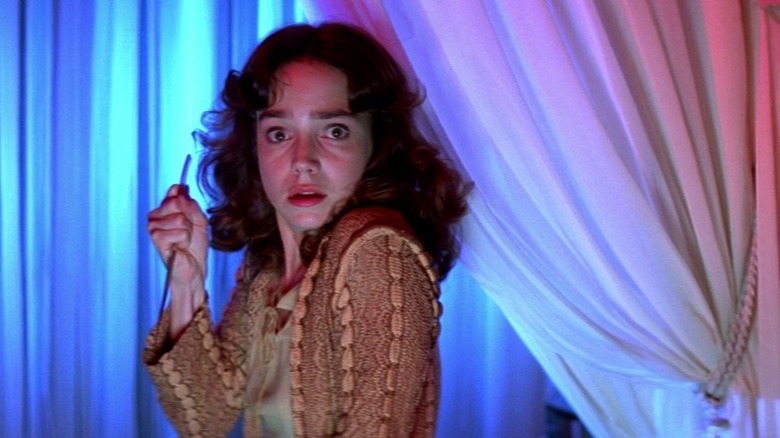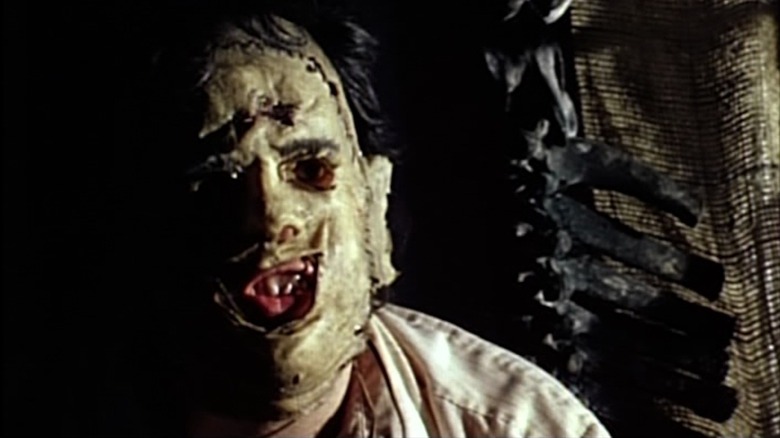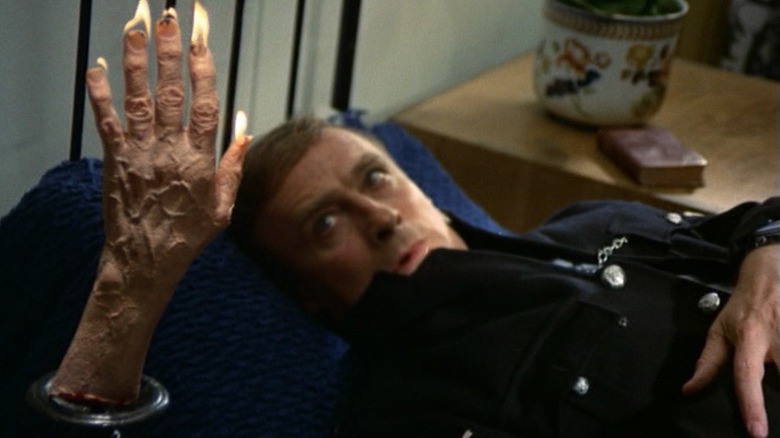'70s Horror Movies You Need To Watch
The 1970s were a terrific time for horror, especially if you like your films ambitious. This decade offered impressive variety in terms of pacing, style, and subject matter, and it produced far more than its share of masterpieces. Some were instantly influential, while others took a longer time to percolate in the cultural subconscious but are, in retrospect, just as awe-inspiring.
It's easy to see why the horror films of this time stand out as being especially brilliant. The genre was strongly affected by the end of the more idealistic '60s. As Karina Wilson of Horror Film History explains, "By 1970, the party was over; the Manson family killed the California hippie dream, the Beatles split, Janis and Jimi died, and it was downhill all the way from there." As the '70s rolled around, things just got worse with Watergate, Kent State, and the escalating conflict in Vietnam. But as Wilson puts it, "Fortunately, when society goes bad, horror films get good." That may be an unusually dark silver lining, but hey, we're horror fans. We like it dark.
Alien
"Alien" is tightly constructed sci-fi horror, and it gave us one of the best genre heroines ever: Sigourney Weaver's tough, capable Ripley. What's not to like?
Well, we should add the caveat that if you hate terrifyingly good practical effects — including an infamous chest-bursting alien that can still produce its fair share of nightmares — then you might want to avoid this smart, chilly masterpiece. Or maybe you want to steer clear of Weaver and renowned character actors like John Hurt, Yaphet Kotto, and Harry Dean Stanton, all of whom turn in strong and finely calibrated performances.
Okay, so there aren't really any good reasons to avoid "Alien." If you're a fan of intense, claustrophobic horror and want a film that makes almost unparalleled use of its isolated and vulnerable setting, "Alien" is for you. Plus, in the course of terrifying you, it'll also raise some fascinating questions about capitalism, the nature of humanity, and all the disconcerting (and often gooey) things that can happen to the human body.
Black Christmas
Released in 1974, the atmospheric and well-crafted "Black Christmas" is one of the earliest slasher movies, coming even before John Carpenter's genre-defining "Halloween." It might not have made the same splash as some of its successors, but it's an incredible film that's aged extraordinarily well.
Olivia Hussey stars as Jess, whose sorority house has been plagued with sinister, obscene phone calls. (These are already enough to make our skin crawl.) We quickly learn that the caller is dangerous when he attacks one of the girls and suffocates her with a plastic bag. But "Black Christmas" stands head-and-shoulders above a lot of slashers by not just turning into a parade of kills at this point. Instead, it lets twists and complications build up the dark suspense.
Everything about "Black Christmas" works. The cast is spectacular, featuring not only Olivia Hussey but also Margot Kidder, Keir Dullea, and horror favorite John Saxon. The sorority house residents are vividly and poignantly characterized and have layered relationships with each other, resulting in one of the subtly feminist classics of horror. It's sublimely horrifying, from the excruciating phone calls to the glimpse of a bulging eyeball to the haunting ending.
Carrie
"They're all going to laugh at you!" If you were ever the butt of the joke — and certainly if you had a rough time in high school — that line will chill you to your core.
Carrie (Sissy Spacek) just gets buffeted from torment to torment. She gets her first period in the showers at the school gym, and she knows so little about her own body that she thinks she's bleeding to death. Her terror and confusion only lead to the other girls mocking her and pelting her with tampons. When she goes home, her fanatically religious mother (Piper Laurie) punishes her because she believes Carrie's period is a sign of her sinfulness. This poor girl is getting it from all sides, and her only refuge is the sudden awakening of her psychic powers. When nice girl Sue Snell (Amy Irving) tries to reach out via arranging for Carrie to go to the prom, it all goes tragically wrong.
Strong acting, stylish direction, and an exquisitely painful and all-too-realistic understanding of savage teen social dynamics have helped "Carrie" stay as powerful now as it was in 1976.
Dawn of the Dead
"Dawn of the Dead" takes all the chilling zombie terror of "Night of the Living Dead" and adds a dose of vicious, potent satire. The result is unforgettable. In this 1978 sequel, the world is largely failing to grapple with the ongoing zombie crisis. Violence, militarization, and ruthless selfishness run rampant. In the midst of all this, a handful of survivors take refuge in — where else? — the mall.
Director George Romero's criticism of consumerism has real teeth, but "Dawn of the Dead" never has trouble combining that intellectual approach with emotion and visceral scares. The apocalyptic angle — advanced from the original film's single night of distress — gives us a grim look at how quickly and thoroughly the world can fall apart and how hard it is to hold onto some internal sense of civilization when the outer trappings are all crumbling. Plus, great makeup and gore work give the film some indelible visuals that range from comedic to horrifying ... and sometimes it hits both notes at the same time.
Don't Look Now
Dreamy, sophisticated, and powerfully emotional, "Don't Look Now" is a horror film that plays on some all-too-realistic adult fears. English couple John (Donald Sutherland) and Laura Baxter (Julie Christie) take a trip to Venice, where John is overseeing the restoration of a cathedral. But it's all coming in the wake of their young daughter's death, and the romance and excitement of the trip are almost inaccessible to the still-fragile, grieving Baxters.
But something strange seems to be waiting for them in Venice. Psychic pronouncements and prophetic glimpses — including visions of their daughter in her telltale red coat, the one she was wearing when she died — keep haunting them. Are they in danger? Will their daughter somehow come back to them again, at least for a moment? Laura comes to believe that the psychic sisters she meets are right to tell her that their daughter is happy and at peace, but John resists both their warnings and their belief in the afterlife — even as he can't stop himself from chasing after the figure in the red raincoat.
Roger Ebert put it best when he said that the film "remains one of the great horror masterpieces, working not with fright, which is easy, but with dread, grief, and apprehension."
Duel
Even in hindsight, knowing exactly how great a director Steven Spielberg would prove himself to be, it's almost unbelievable that "Duel" was his first full-length feature. Absolutely nothing about it feels amateurish. It's a masterful, gripping horror-thriller made with incredible confidence — and all on a Movie-of-the-Week budget.
David Mann (Dennis Weaver) is on a long drive through the desert, destined to spend hours cramped up in his car. He passes a seemingly dilapidated semi-truck ... and the trucker decides to kill him. What follows is a grueling but adrenaline-filled cat-and-mouse game across the mostly desolate Mojave — one that we're destined to remember every time a truck starts following us a little too closely. It's completely believable that road rage could mutate into something this determined and persistent, and why shouldn't a serial killer use a truck as his weapon?
"Duel" has fantastic cinematography and a great, gritty sense of Americana, but its biggest draw is its relentless sense of tension. Once you start watching, it's almost impossible to pause.
Eraserhead
David Lynch's "Eraserhead" isn't going to be for everyone, but we find it absolutely haunting. It's a surreal film that takes place on a completely different plane of reality and defies most normal explanations.
Henry Spencer (Jack Nance) lives in a blasted landscape full of awkward conversations and horrifying sights. Even dinner with his girlfriend's family is punctuated by him having to carve a kind of chicken that's still moving and bleeding, and on top of that, he abruptly finds out that his girlfriend has had a child. The baby — their baby — is one of horror's most disturbing creations, a mewling larva-like creature. Soon, Henry is the baby's sole caretaker, and either his sanity, reality, or both start slipping away.
"Eraserhead" is a shockingly raw portrait of parental anxieties and resentments, creating a world where a new father's sense of self gets slipperier and slipperier as his hard-to-love baby won't stop crying and any outlet for sex or even adult connection slips further and further away. It's a harrowing example of just how real "weird" films can get.
The Exorcist
Regan — a happy, healthy girl with a mostly settled life — undergoes a rapid and troubling decline in William Friedkin's "The Exorcist." The resulting film is one of the most famous horror movies ever made, and it lives up to its reputation.
The steady, sure pacing brings the audience forward step by inexorable step, leading even the most skeptical viewers to the demonic truth in a way that feels frighteningly plausible. The dual performance of Linda Blair — as Regan, the truly frightened and all-too-vulnerable child — and Mercedes McCambridge — the voice of the demon dwelling inside her — will forever be seared into our minds. Blair and McCambridge are only the most memorable parts of a stellar cast, one where even the most minor of supporting actors bring depth and texture to their roles.
And, of course, the movie provides plenty of truly nightmarish horror, with its iconic images including everything from pea soup vomit to eerie sights like Regan's body slowly rising into the air.
Halloween
John Carpenter's "Halloween" helped define the slasher genre. Many films have tried to copy its haunting simplicity, but few have come close to the glories of the original.
Michael Myers — a kind of terrifying child prodigy, guilty of murdering his older sister when he was only six — has been locked up for years, first treated and then simply contained by Dr. Loomis (Donald Pleasance), who now believes that Michael has nothing inside him but emptiness and evil. But one fateful Halloween — the anniversary of his sister's murder — Michael is able to return to his peaceful hometown. He's ready to continue his murder spree ... this time targeting young babysitter Laurie Strode (Jamie Lee Curtis) and her friends.
"Halloween" knows exactly what it's doing, and Carpenter expertly wrings every drop of terror from his premise. It's utterly unsurprising that this one has become an immortal classic, with Michael acting as a kind of universal "boogeyman."
Jaws
No matter how many times we learn that sharks seldom attack people, rewatching "Jaws" makes us newly afraid to go into the ocean. Who knows what could be down there?
From start to finish, "Jaws" is basically a flawless film, one that blends horror, adventure, and likable and nuanced characters so well that it seems effortless. Roy Scheider stars as Martin Brody, the put-upon police chief of the beach town of Amity. When a shark fatally mauls a young woman, Brody wants to close down the beaches, but the mayor (Murray Hamilton) has his eye on the bottom line: Amity needs those summer tourist dollars too badly to shut down their town's main attraction. Needless to say, more carnage ensues, and soon, all hands are on deck for a shark hunt. Brody reluctantly sets sail with oceanologist Hooper (Richard Dreyfuss) and veteran fisherman Quint (Robert Shaw), determined to eliminate the threat and keep Amity safe.
By keeping the shark mostly off-screen for nearly the entire film, "Jaws" builds almost unbearable suspense — aided by one of the best and most foreboding themes in the movies. This is man vs. monster terror at its finest. Beautifully plotted, perfectly shot, and charismatically acted, "Jaws" is the ultimate summer blockbuster.
The Omen
Gregory Peck alone would be enough to lend this satanic child thriller gravitas, but even outside of his grounding presence, "The Omen" nails its (appropriately) ominous vibe.
Robert Thorn (Gregory Peck) makes a fateful decision when he conceals a stillborn child from his beloved wife, Katherine (Lee Remick). Wanting to spare her the grief, he goes along with the hospital's suggestion to informally adopt another newborn boy: Damien (a name that, thanks to this movie, feels almost synonymous with sinister children.) As Damien grows up, however, his unknown origins start to matter more and more — because something is clearly wrong. Animals shy away from him. His nanny hangs herself, calling out to him in ecstatic tones to offer up her death in his honor. And that's only the first of several mysterious fatalities that will occur in Damien's vicinity. Robert begins to doubt his son's humanity, but will he be able to decisively act on this new knowledge?
Memorable deaths, strong performances, a genuine sense of dread, and a boy's spectacularly creepy smile make "The Omen" a perennial horror favorite.
The Stepford Wives
"The Stepford Wives" is a gem, deftly juggling both its horror and its satire — and making sure both have plenty of power and bite.
The movie has an incredibly strong cast, with Katharine Ross giving an especially powerful performance as Joanna Eberhart. Joanna, a gifted photographer, moves to Stepford, Connecticut, with her husband and two children, but the move is a dispiriting one. For all the peace and quiet the seemingly idyllic Stepford offers, something is terribly wrong here. Almost all the women glide around in flowing dresses, offering cheerful and vacuous smiles as they endlessly discuss housework and their devotion to their husbands, who spend much of their time holed up at the Men's Association, which Joanna's own husband quickly joins. Joanna does make a few friends among the handful of women who still have their own interests and personalities, but the creeping trouble of Stepford soon overtakes them too. Joanna is terrified, and so are we.
The anxieties "The Stepford Wives" explores — is your partner really supportive, or does he secretly wish you would act differently? — are still all present and accounted for, and they've seldom been explored better or more incisively than they are here.
Suspiria
If you've never seen any of Italy's violent, visually stunning horror films, we recommend diving in here: "Suspiria" is surreal, lurid, and an all-around good time. The movie tells the story of what happens when the innocent Suzy Bannion (Jessica Harper) enters a German ballet school that turns out to double as a witches' coven. Truly, a universal problem we've all faced at one time or another.
While the plot of "Suspiria" mostly functions as connective tissue between the gruesome murders and outstanding set-pieces — including everything from a rain of maggots to vicious impalings to a pit full of razor wire — it moves along swiftly and with maximum unease. Suzy's attempts to figure out just what is going on at the Tanz Dance Akademie are dogged and heroic, making her a protagonist worth rooting for. She provides a still, relatable center to the whirling weirdness around her.
But the biggest pleasures of "Suspiria" are all aesthetic. The film boasts an incredible score and some of the genre's best and most colorful visuals. The sets, the lighting, the costumes, and the effects are all unforgettable.
The Texas Chain Saw Massacre
Don't watch "The Texas Chain Saw Massacre" while eating, but do watch "The Texas Chain Saw Massacre" because this gritty 1974 horror film is one of the best around. (But we still think "chainsaw" is one word.)
When some rural Texas cemeteries are hit by a rash of vandalism, Sally (Marilyn Burns) and her brother, Franklin (Paul A. Pertain), decide to make sure their grandfather's grave remains undisturbed. It could be a bleak errand, but they've brought along some friends, and it's turned into a kind of laid-back road trip instead. Until, that is, they pick up the wrong hitchhiker. This nameless young man — played with live-wire energy by Edwin Neal — quickly reveals that both he and this part of the countryside are characterized by a kind of drifting, unsettled violence. The slaughterhouse layoffs have created a kind of angry turmoil ... and Sally is about to be thrown into the middle of it. It's a welter of brutality, cannibalism, filth, secrets, and gothic family relationships.
Plenty of horror films scare us, but "The Texas Chain Saw Massacre" very nearly stands alone in terrorizing us so much that we, like its heroine, are left in a state of slightly delirious exhaustion. There isn't much on-screen gore here at all, but the nightmarish and perversely matter-of-fact suggestions of it are bad enough.
The Wicker Man
"The Wicker Man" is an essential folk horror film, and it's so sunny and whimsical and energetic throughout that it hides its darkness very well until the final act.
Edward Woodward plays Sgt. Neil Howie, a starchy, upright, and devoutly Christian policeman who goes to the isolated Summerisle to investigate the rumors of a child's disappearance. Howie is taken aback — even disgusted — by Summerisle's pagan traditions, which he sees as fundamentally irreligious and often shockingly sexual. He's undeniably judgmental ... but he's also devoted to sniffing out the truth of what happened to the child, and he's understandably disturbed by how little cooperation he gets from the disconcertingly playful islanders, who seem to know something he doesn't. He wants to save the girl from what he suspects is an impending human sacrifice, and as he valiantly strives to do this, we find out that "The Wicker Man" still has a few dark tricks up its sleeve.
The rigid, hard-to-like Howie is the perfect foil for the cheerful but sinister islanders, and the audience's sympathies will likely move around wildly while watching "The Wicker Man." The complex characterization and morality give strong dramatic underpinnings to this often deceptively lighthearted film. This ending remains one of the best of all time.
